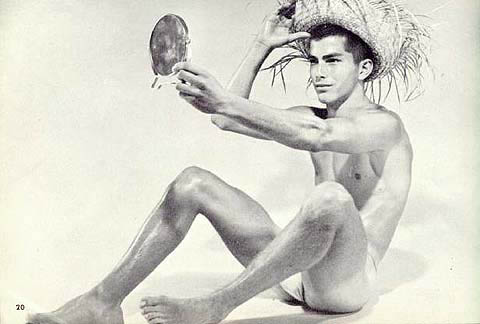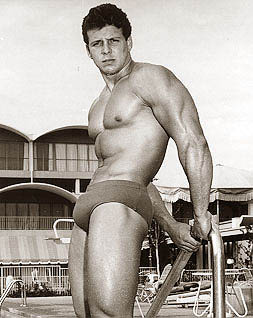Vintage Thursday

Hercules was not only the strongest of the heroes (even as a baby he killed two great serpents with his bare hands) but he was also the craziest (he murdered his first three sons in a fit of madness) and the smartest (what he could not accomplish by brute strength he achieved through guile). What is less well known these days is that he was as heroic in bed as he was standing up.
One time he was invited by king Thespios to help him rid the land of a huge lion that was terrorizing the countryside. When the king set eyes on Hercules he had a better idea: "Come and stay the night at my palace, and rest yourself before the hunt," said the king to Hercules, "and meet my family." As Hercules was soon to find out, the king's family was made up mostly of his fifty virgin daughters, for whom he had not found fitting husbands until then. That night Hercules met them all, and made love to forty nine of them (the fiftieth was too shy). The next morning he and the king went off to hunt the lion, and nine months later all forty nine daughters gave birth to sons. 
Much as he loved women, Hercules loved youths no less. Plutarch said that the number of his lovers was beyond counting. What we know for sure is that he had more than even the god Apollo (who was no slouch when it came to male love). Most stories about the beloved boys of Hercules have been lost or destroyed, but among his lovers were said to be the young heroes Admetos, Iphitos, and Euphemos, all of them Argonauts, Elacatas, honored by the yearly Elacatia games in Sparta, and Abderus, an Opian boy and son of Hermes, whose love for Hercules cost him his life, and who was honored with his own festival in the city that bore his name.
He was the young man to whom Hercules entrusted the man-eating mares of king Diomedes. Not strong enough to keep them in check, they tore him to shreds and devoured him. Heartbroken, Hercules built the city of Abdera in his memory. There was also a myth, now lost, that claimed that Eurystheus, the king for whom Hercules performs his labors, was one of his lovers, and that Hercules undertook the labors in order to please him. If so, then male love becomes the central motive force of the Hercules cycle, just as the love between Achilles and Patroclos is the fire that drives the story of the Iliad. 
Also among his lovers, and not so unlucky, were Philoctetes who inherited Hercules's bow and arrows, and who was called upon to use them in the Trojan war, and Nestor, the youngest son of king Neleus, whom he grew to love more than any other lad. Nireus, Adonis, Jason, Corythus, Stychius, and Phrynx were reputed to have been amongst his lovers as well. But these stories have been lost.
Of all his boyfriends however, the ones he loved the best (besides Nestor) were Iolaos of Thebes, and Hylas of Argos. Iolaos, was also his nephew and, though only sixteen, his helper in many of his labors. It was said that their love was such that Hercules found those labors easier when Iolaos watched him. He was Hercules' charioteer and beloved, just like Patroclos was for Achilles. 
As Plutarch tells us: "And as to the [male] loves of Hercules, it is difficult to record them because of their number; but those who think that Iolaos was one of them do to this day worship and honor him, and make their loved ones swear fidelity at his tomb." And also, "It is a tradition likewise that Iolaos, who assisted Hercules in his labors and fought at his side, was beloved of him; and Aristotle observes that even in his time lovers pledged their faith at Iolaos' tomb." The Thebans thought so highly of Iolaos that they worshiped him together with Hercules, named their gymnasium after him, and in his honor held yearly contests, the Iolaeia.
As for the love between Hercules and Hylas, the poet Theocritus, who wrote 300 years before our era, had this to say: "We are not the first mortals to see beauty in what is beautiful. No, even Amphitryon's bronze-hearted son, who defeated the savage Nemean lion, loved a boy-charming Hylas, whose hair hung down in curls. And like a father with a dear son he taught him all the things which had made him a mighty man, and famous. 
And they were inseparable, being together both day and night. That way the boy might grow the way he wanted him to, and being by his side attain the true measure of a man. When Jason sailed after the golden fleece, and all the nobles went with him invited from every city, to rich Iolkos he came too, the man of many labors, son of noble Alcmena.
And brave Hylas in the flower of youth went with him aboard the Argo, the strong-thwarted ship, to bear his arrows and to guard his bow."









1 comment:
Excellent, love it! kent freshwater plant supplement Prozac withdrawal symtoms Zyrtec inner ear problems d drug store images google com auimages q fat porn chicks ads swingers milfs florida Babies on topamax What is a soccer field Water filters directory eczema nobel pimecrolimus
Post a Comment